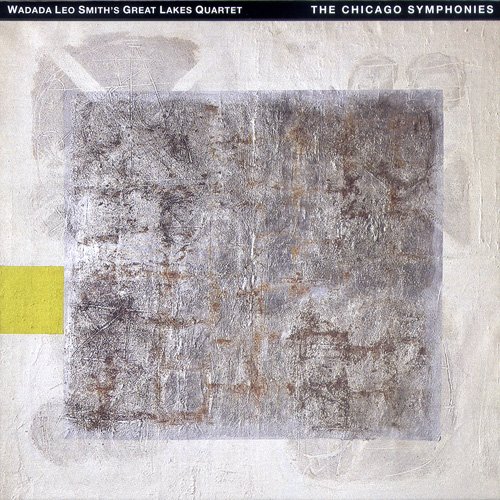
Artist: Wadada Leo Smith's Great Lakes Quartet
Album: The Chicago Symphonies
Genre: Avant-Garde Jazz, Free Jazz
Label: TUM Records
Released: 2021
Quality: FLAC (tracks+.cue)
Tracklist:
- CD 1 - Gold Symphony No. 1:
- Light Fields and Circles (9:34)
- Joyful, Sound and the Numbers (9:30)
- Pastoral (7:17)
- Creative Music (10:48)
- Star-Fields (2:44)
- CD 2 - Diamond Symphony No. 2:
- The Rare Air Songs in Sonic Forms and Metrical Folding (12:13)
- Chicago (6:51)
- Muhal Richard Abrams (10:26)
- Jack DeJohnette (7:08)
- CD 3 - Pearl Symphony No. 3:
- For Alto (10:48)
- Leroy Jenkins Mixed Quintet Sonics (3:08)
- Heliocentric Sun Ra's Energy and Particles of Light (7:00)
- Jupiter Skies (11:07)
- Scented Yellow and Red Chrysanthemums (6:45)
- CD 4 - Sapphire Symphony No. 4:
- Abraham Lincoln (6:02)
- Abraham Lincoln at Gettysburg (11:18)
- The Visionaries (10:44)
- Barack Hussein Obama at Selma (15:06)
- Barack Hussein Obama (6:03)
DOWNLOAD FROM FILECAT.NET >>>
The prolific virtuoso Wadada Leo Smith gave us two TUM Records box sets in the first half of 2021 and will end the year with two more, including the very ambitious The Chicago Symphonies. The four-disc collection features the trumpeter/composer's Great Lakes Quartet with saxophonist/flutist Henry Threadgill, bassist John Lindberg and drummer Jack DeJohnette. The final disc trades Threadgill for saxophonist Jonathon Haffner.
Smith, who composed each of the movements, took his inspiration from Don Cherry 's Symphony for Improvisers (Blue Note, 1967) and expanded the creative content to include wider-ranging cultural aspects. Smith has effectively worn the mantle of activist/musician approach for some time, as heard on his Pulitzer Prize-nominated Ten Freedom Summers (Cuneiform Records, 2012), America's National Parks (Cuneiform Records, 2016), and Rosa Parks: Pure Love (TUM Records, 2019). Highlighting the exceptional contributions of Midwesterners to creative music is another of Smith's objectives on Chicago Symphonies. With the exception of Lindberg, the quartet are all long-standing members of the Association for the Advancement of Creative Musicians (AACM). Lindberg is a native Midwesterner, hailing from Michigan, now living in New York. Sections of movements pay tribute to Muhal Richard Abrams, Anthony Braxton, Leroy Jenkins, Sun Ra, and others with Chicago area affiliations. An additional nod to the region comes in the form of the final Sapphire Symphony where Smith pays tribute to two Illinois political legends, Abraham Lincoln and Barack Obama.
Gold Symphony—No. 1 consists of five movements in three segments. On "Movement 1," Smith's familiar parched tone and extended silences give way to a complex motif; Threadgill and the trumpeter play off each other while Lindberg and DeJohnette cut through to assume more prominent roles. "Movement 2" allows for solo time with DeJohnette accompanying each of his bandmates. A contemplative respite follows before a mélange of styles pays tribute to Louis Armstrong, Baby Dodds, Lil Hardin Armstrong, and Earl Hines.
Diamond Symphony—No. 2 with a tranquil Threadgill flute introduction, is quickly overtaken with multifaceted rhythms and rapidly changing patterns. DeJohnette drives the action on this disc, like maneuvering a train through roller coaster drops and slow turns. A frenetic pace dominates the first movement of Pearl Symphony—No. 3 but the section winds down with a glacially paced Threadgill bass flute. The idyllic "Movement 2" reflects Smith's affinity for the classics. Threadgill is a noticeable absence on Sapphire Symphony—No. 4. Much of the stately "Movement 1" is given over to DeJohnette and Smith, but by "Movement 2," Haffner's rounded saxophone sound and Smith's piercing trumpet create a harsh scuffle in the drift of the music. In the final "Movement 5"—the second dedicated to former President Obama—Smith's playing is majestic and soaring.
The Chicago Symphonies were written with a larger ensemble in mind. To that end, Smith can maximize and minimize within the confines of movements. As he approaches his eightieth birthday, Smith remains a remarkable figure in contemporary music, building on the rituals of avant-garde, classical, and jazz music. Figures that descend from different genres sweep in and bow out of the picture in continually fluctuating patterns. There are occasions when The Chicago Symphonies run out of steam but across nearly three hours of music, they are relatively few.
Review by Karl Ackermann

